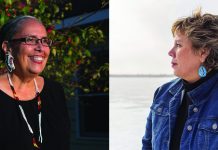LAST NOVEMBER, the Reverend Leith Anderson was sitting in his Eden Prairie home when he spotted a familiar face on television. It was Ted Haggard, a prominent Colorado pastor who was then the president of the National Association of Evangelicals (NAE), a job Anderson himself had once held. Haggard, who liked to be called “Pastor Ted” and who had, at various times, waged high-profile campaigns against abortion and same-sex marriage, had just admitted to “sexual immorality” with a male prostitute and to buying methamphetamines— disclosures that would no doubt destroy his career and his standing in the evangelical community. As cable-news channels broadcast clip after clip of Haggard fending off reporters, Anderson had a sinking feeling.
“Just wait,” he told his wife. “They’re going to call me.”
Anderson’s confidence had nothing to do with ego. As senior pastor of Wooddale Church, a Baptist-affiliated megachurch with 5,000 attendees (including Governor Tim Pawlenty), he certainly has the qualifications, managing a staff of 100 and a budget of $10 million. And the NAE—an organization that claims to represent 30 million evangelical Christians in the United States—had enlisted his help before: In 2001, Anderson was asked to become interim president after the organization faced a financial crisis. Two years later, after putting the group back on solid footing, he turned it over to Haggard. This time around, with the dust of Haggard’s implosion still settling, the NAE needed someone who could inspire confidence among its members and project a credible image to the public. Anderson, with his experience and unflappable demeanor, was the obvious candidate. The call came within hours.
Given the circumstances, Anderson might have been expected to be little more than a figurehead at the NAE, a familiar presence during a time of uncertainty. But since taking over, he has done much more than make people forget Pastor Ted. In his own quiet way, Anderson has become a key leader among those seeking to take the Christian right beyond a narrow focus on abortion and gay marriage—to do nothing less than redefine what it means to be an evangelical in this country.
IN MANY WAYS, Anderson is the anti-Ted Haggard. At 62, with his graying hair and steel-rimmed glasses, he has none of his predecessor’s telegenic flair or showmanship. In the pulpit, he tends to be scholarly rather than spellbinding. His personal life is remarkably stable. He’s been married for 42 years and has held the same job for three decades. He keeps a surprisingly low profile for a megachurch pastor, steering clear of culture wars and political campaigns. Until recently, most people outside the evangelical world had never heard of him.
That began to change in March, when one of the most powerful conservative religious figures in the country, Focus on the Family founder James Dobson, publicly called for the NAE board to fire its longtime governmental affairs director, Rich Cizik. Cizik’s sin had been to insist that global warming was a moral issue—of “creation care”—that evangelicals should address. In a letter to the NAE board, Dobson accused Cizik of “using the global-warming controversy to shift the emphasis away from the great moral issues of our time,” a list that included “the sanctity of human life, the integrity of marriage, and the teaching of sexual abstinence.”
When Dobson says jump, most religious conservatives ask how high. Anderson had other ideas. He decided to ignore Dobson’s letter, save to note that those calling for Cizik’s ouster weren’t actually members of the NAE: “We don’t seek counsel on employment matters from people who don’t belong to our organization,” Anderson coolly told reporters. Rather than fire Cizik, the NAE board offered him a chance to speak at its annual meeting.
As showdowns go, this was pretty mild stuff. But for many evangelicals, Anderson’s stand was a defining moment—a declaration of independence from a narrow, partisan agenda—and it marked him as a key figure among a new breed of Christian leaders. “We’re reclaiming our heritage,” says Cizik. “And the support we’re getting from the people in the pews is overwhelming. There’s a whole lot of quiet cheering going on.”
This is not an entirely comfortable role for Anderson. For someone who preaches to thousands every weekend, he is, in fact, surprisingly reluctant to be the center of attention. When asked to talk about himself, he becomes about as chatty as Dick Cheney. You could perhaps chalk it up to being from Minnesota, except that he isn’t from Minnesota. He was raised in Bloomfield, New Jersey (hometown of The Sopranos, he notes). Until Anderson moved to Minnesota, he was the only Anderson he knew.
He had never planned on becoming a preacher. Though his father presided over a large Baptist congregation, Anderson planned to teach sociology. After college, he took a job at a church in Colorado, where he realized he was applying much of what he’d studied, albeit in a different context. “I love seeing how God works in people’s lives over a long period of time,” he says, sitting in a large leather chair in his book-lined office. “A college teacher gets to watch a student change over four years. But a pastor gets to watch over entire generations.”
He went on to earn a master’s degree from Denver Seminary, where he was deeply influenced by its president, Vernon Grounds, a passionate advocate for social justice. Studying under Grounds, Anderson learned that evangelicals had a long history of social activism—predating the Civil War—a slice of history that he often cites to refute the notion that there is anything particularly new or noteworthy about evangelicals addressing timely social issues. “We’re simply being who evangelicals have always been for 150 or more years,” he says. “If you take Jesus and the Bible seriously, you’ll end up doing some kind of social action with a concern for the poor. That’s what happens when you live out your faith.” An interest in climate change is part of that creed, he says, especially since the world’s poorest people would be most affected.
Of course, plenty of critics have argued that evangelicals’ recent efforts to broaden their agenda—by addressing Darfur, AIDS, or climate change—is simply a case of window dressing, of trying to maintain the movement’s political appeal after the public soured on much of their agenda. The NAE, after all, remains adamantly opposed to gay unions, legal abortions, and stem-cell research. At the same time, evangelical leaders like Anderson are under pressure to reaffirm their conservative credentials to offset any hint that they could be, God forbid, Democrats, or worse—liberals. After the NAE board meeting, for instance, Cizik assured the Washington Post he had, in fact, voted for both Ronald Reagan and George W. Bush. Twice.
“It’s gotten to the point where ‘evangelical’ is no longer an effective word,” says Gregory A. Boyd, senior pastor of the Woodland Hills Church in St. Paul. A few years ago, Boyd lost one-fifth of his congregations after he told his followers that the church should get out of politics and banned the distribution of election-related pamphlets. “If a stranger finds out I’m evangelical, they often assume I’m an intolerant, flag-waving Republican who’s against gays,” Boyd says. “It can be a huge obstacle to talking about one’s faith.”
Anderson’s precarious position becomes apparent when discussing anything remotely controversial. He tends to choose his words with extreme caution, like a man picking his way through a minefield. When talking about an anti-torture resolution put out by the NAE, for example, he speaks only of “alleged” torture of Iraqis by U.S. troops. Only briefly does Anderson admit his disapproval for the Bush administration’s definition of torture, which allows severe abuse.
He is even more diplomatic when addressing the controversies within the evangelical community. Four months after his public spat with Dobson, he goes out of his way to underplay the controversy, as if the whole thing were merely a misunderstanding rather than a fundamental debate about the direction of the movement. This is perhaps understandable. As head of the NAE, he has to negotiate a political minefield trying to keep evangelicals—a notoriously fractious bunch—reasonably united. “We’re not trying to define evangelicalism,“ he says. “We’re just saying the movement is bigger than two or three issues. And for us, that’s a strength.”
As a pastor, Anderson has long kept his political views to himself, a choice that could be seen as its own sort of statement. But as the electoral map changes around the country, it’s clear that Anderson sees an opportunity to carve out a new, less predictable identity for evangelicals—to create a place for a Christian like himself. “Ten years from now, I hope evangelicals are known not for their politics, but for their faith,” he says. “At least that’s what I’m working for.”
Lynnell Mickelsen is a freelance writer based in Minneapolis.







